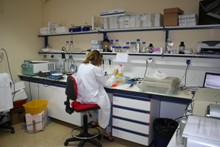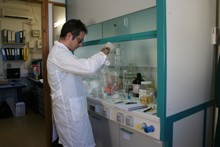Laboratory of TOXICOLOGICAL CONTROL OF PESTICIDES
The main objective of the Laboratory of Toxicological Control of Pesticides is that of safety during the production of agricultural products, with regards to the safe use of plant protection products (PPPs), biocidal products (BPs), and insecticides with possible public health consequences.
Activities
The key areas of scientific activity of the Laboratory of Toxicological Control of Pesticides are the toxicological assessment of PPPs and BPs for authorization at a national and European level, as well as research activities concerned with at the safety of humans and the environment in the context of PPP use.
Toxicological assessment of PPPs and BPs involves the evaluation of toxicological studies and the definition of the hazards of PPPs, BPs and their active ingredients. It requires determination of safe exposure levels for those involved in agricultural practice, as well as risk-assessments to be performed on behalf of consumers, operators, bystanders and other farm workers. Based on the outcome of the toxicological assessment, classification and labeling of the hazardous substances and preparations is proposed, along with risk mitigation measures such as the use of appropriate personal protection equipment for the operators of PPPs.
The Laboratory is actively involved in research and other scientific projects funded by the European Union, national bodies and the private sector. Research studies are conducted to identify adverse effects on non-target organisms, to monitor exposure levels of operators and the rural population, to improve the standard of personal protective equipment, to develop tools suitable for reliable risk assessment, and to develop and monitor biomarkers for the early diagnosis of adverse effects on humans, aquatic organisms and beneficial insects.
The Laboratory runs a Wistar rat breeding unit for experimentation and a unit for growing aquatic organisms (such as juvenile Gambusia affinis). It has a broad expertise in growing and experimentation with other aquatic organisms, including bacteria, microalgae, Daphnia magna, Artemia salina, Brachionus plicatilis, Mutilus galoprovencialis etc.
The expertise of the Laboratory scientific staff has resulted in participation in several activities of national and international interest.
Since 2004 the Laboratory has implemented a Quality Assurance System in its experimental trials, and is currently certified by the National Accreditation System (ESYD) in ISO 17025:2005 (Accred. No. 596) to conduct a series of experimental tests.
Main fields of current research
The main areas of the Laboratory research activities are associated with:
- The development and certification of personal protective equipment suitable for warm climatic conditions
- Monitoring of the operator and rural population exposure levels to PPPs
- The development of mathematical models for the estimation of operator exposure levels to PPPs and for reliable risk assessment
- The development and monitoring of precursor markers for detecting effects on the physiology of humans, aquatic organisms and beneficial insects
- The development of molecular techniques for the detection of toxic effects
- The development and authorization of environmentally-friendly PPPs to promote environmental safety and public health
- Developing methods for studying the combined action of toxic agents on genetic material
- Investigation of the toxicological effects of PPPs and other substances in mammals (rats)
- Investigation of the toxicological effects of PPPs and other substances in aquatic organisms, acting as indicators of aquatic ecosystem health
- Application of the principles of an environmentally-friendly plant protection strategy to protect vulnerable water ecosystems
- Identification and monitoring of pesticide levels in honeybees
- Identification and monitoring of coastal pollution, using biological indicators and chemical analyses
Training
The Laboratory of Toxicological Control of Pesticides is actively involved in the following training activities:
- Supervision of undergraduate students, helping them to gain related practical experience, and implement their final-year projects
- In collaboration with affiliated universities, the supervision of postgraduate students, allowing them to conduct their research projects leading to MSc and PhD degrees
- Training of subject-matter professionals, including farmers and agronomists
- Participation in teaching programs at universities and Technical Institutes
Scientific laboratory staff
Konstantinos M. Kasiotis, PhD, Chemist, Research Director, Head of the Laboratory
Aikaterini Termentzi, PhD, Agronomist, Senior Researcher
Efrosini Katsanou, PhD, Biochemist, Senior Researcher
Ioannis A. Theologidis, MSc, PhD, Biologist, Senior Researcher
Eliana Spilioti, PhD, Chemist, Senior Researcher
Eirini Baira, MSc, PhD, Molecular Biologist, Associate Researcher
Evangelia Tzanetou, PhD, Chemist, Associate Researcher
Anastasia Repouskou, PhD, Biologist, Associate Researcher
Niki Arapaki, MSc, Chemist, Research Scientist
Anastasia Spyropoulou, MSc, Biologist, Research Scientist
Vasileia Laskari, MSc, Biologistit, Research Scientist
Agathi Charistou, MSc, Chemist, Scientist
Polikarpos P. Mpeikos, MSc, Chemist, Scientist
Stavroula Maria Kiousi, MSc, Chemist, Scientist
Dimitra Nikolopoulou, MSc, Biochemist, Scientist
Marios K. Meintanis, MSc, Agronomist Technologist
Pelagia Anastasiadou, MSc,
Agronomist & Fishing Technologist
Alexandra Dekanea, MSc, Agronomist Technologist
Kyriaki Machera, PhD, Regulatory Toxicologist, Research Director, Εmeritus Researcher of Institute
Despina Bournele, MSc, PhD, Biologist
Vasiliki Hatzi, MSc, PhD, Biologist
Evangelia Katsavou, MSc, PhD, Biologist
Anastasia Stavropoulou, MSc, Chemist
Anna-Evgenia Papadopoulou, MSc, Agronomist
Alexandra Nestora, MSc, Biologist
Theodora Barmpouni, Agronomist
Electra Manea-Karga, MSc, Food Technologist

